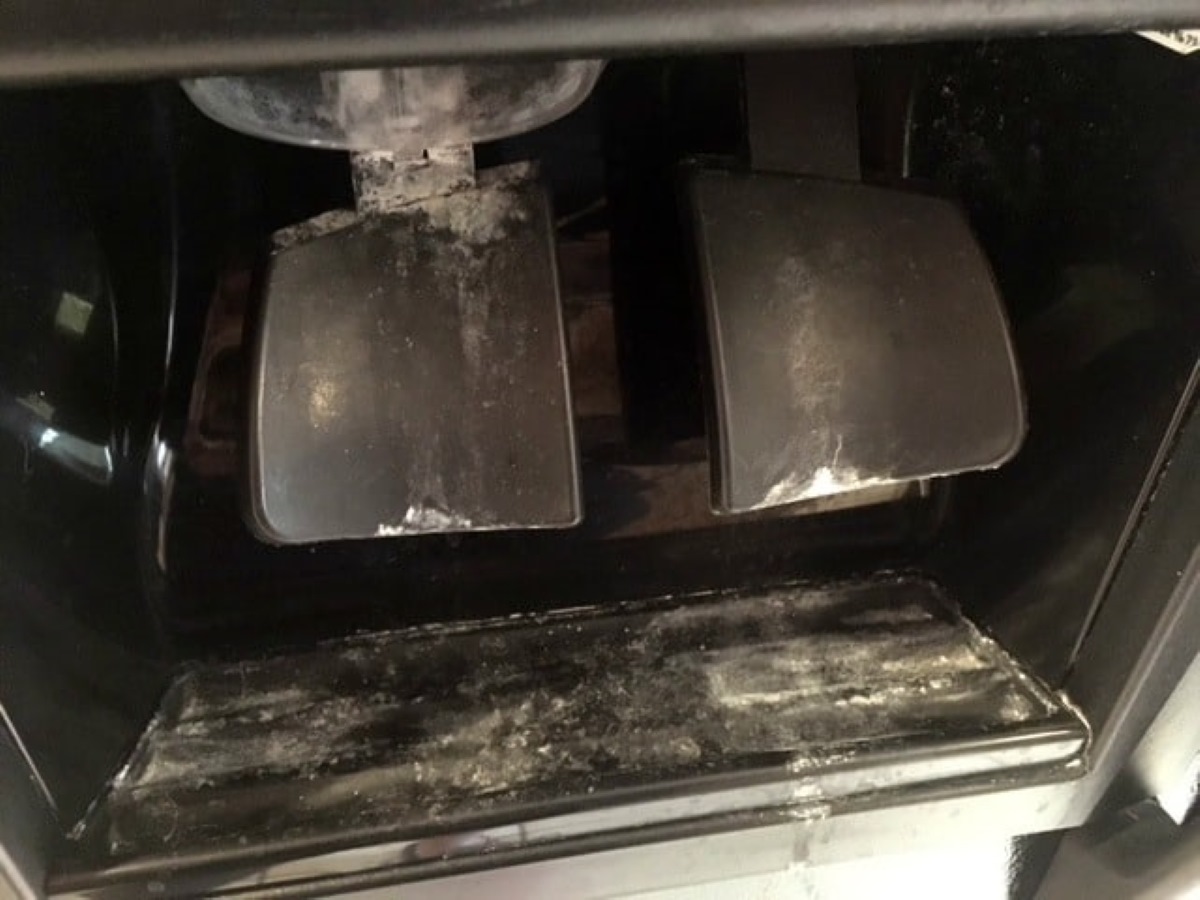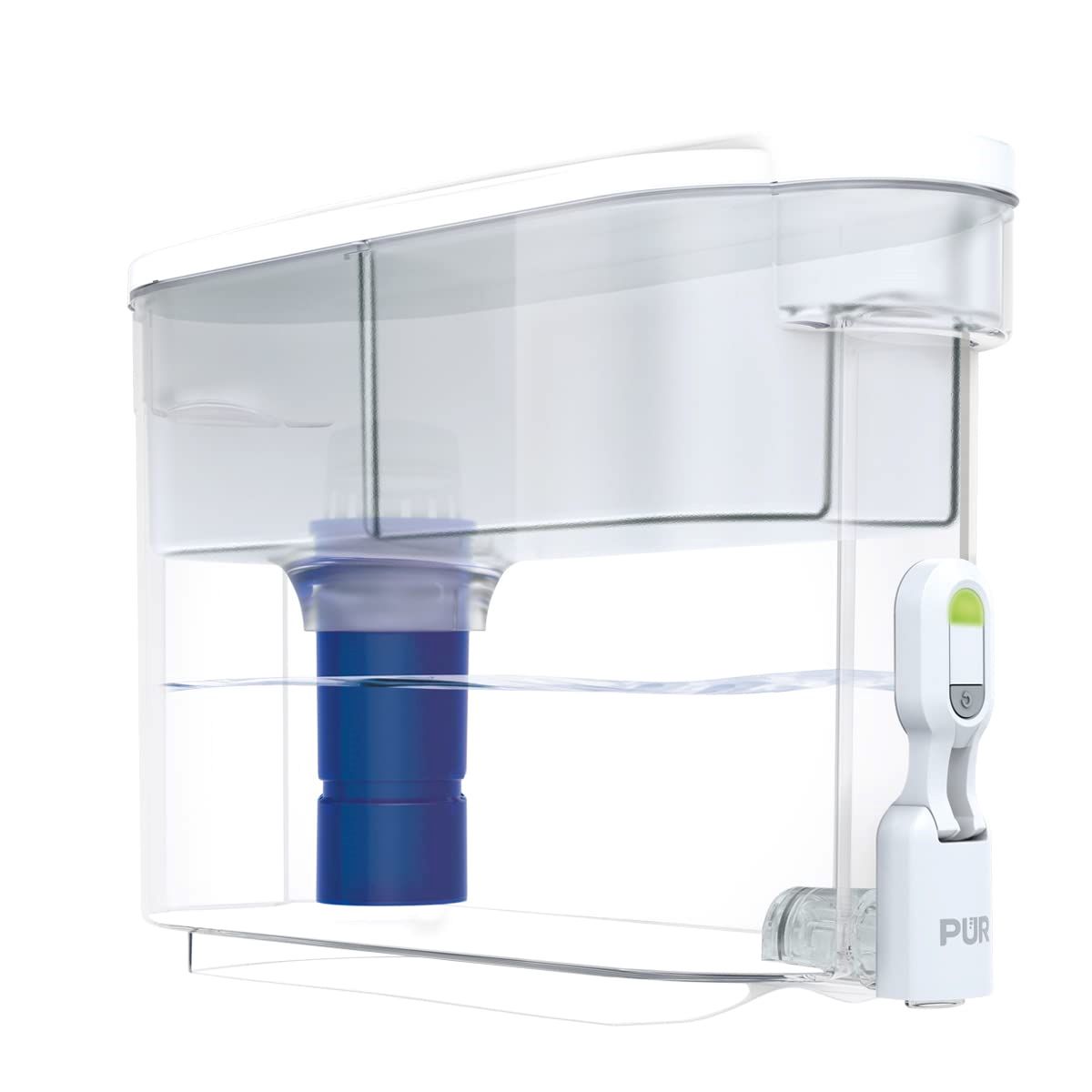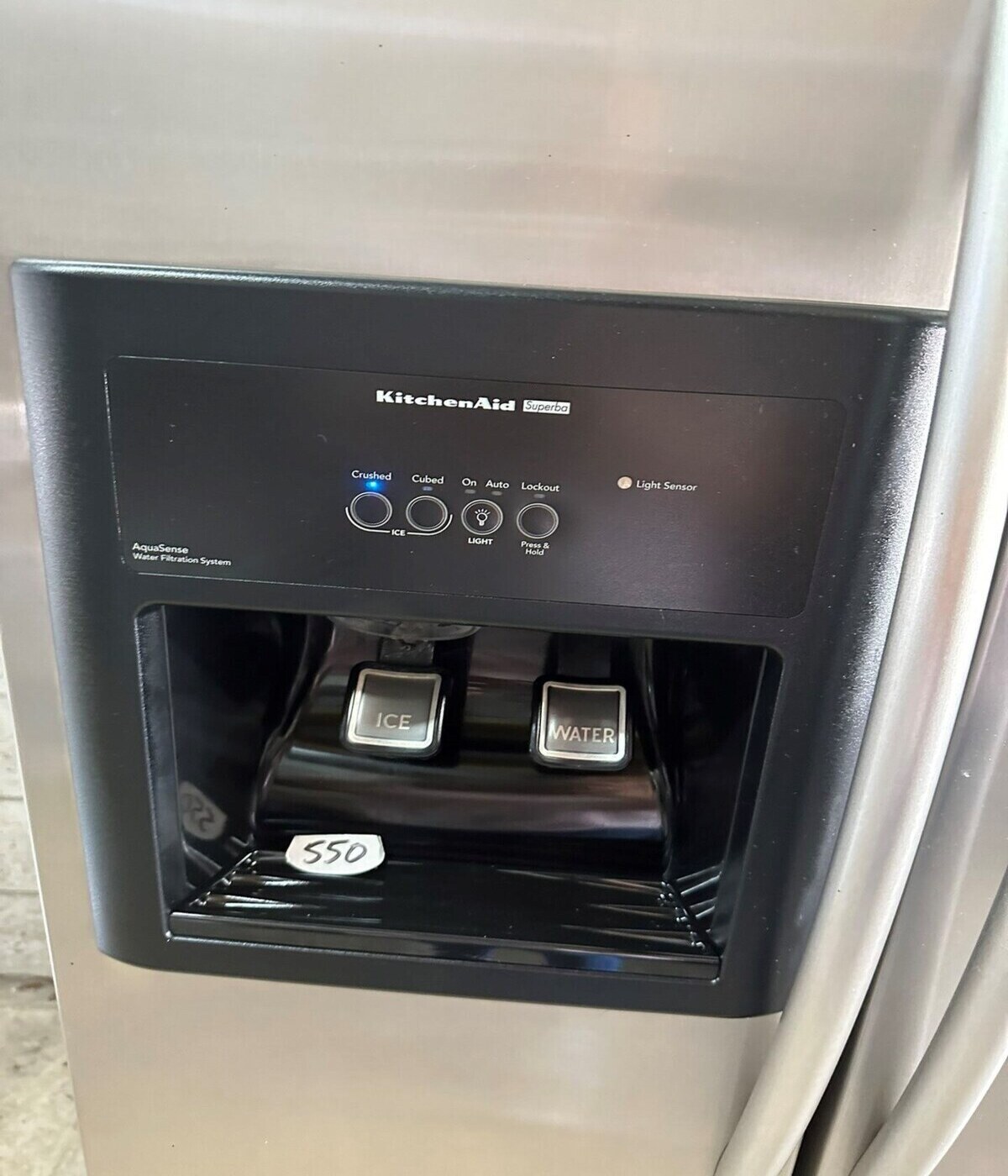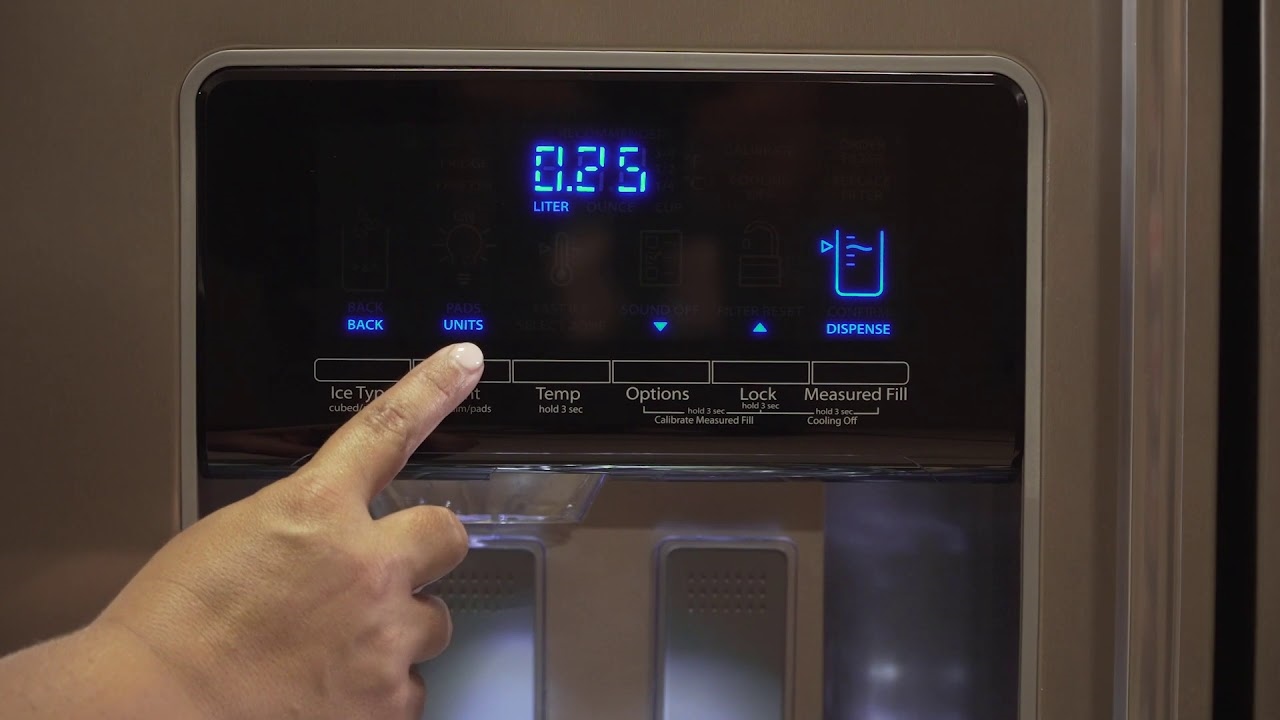Home>Articles>How To Clean Hard Water Stains From Refrigerator Water Dispenser


Articles
How To Clean Hard Water Stains From Refrigerator Water Dispenser
Modified: September 1, 2024
Looking for expert articles on how to clean hard water stains from your refrigerator water dispenser? Find valuable tips and tricks here to keep your dispenser sparkling clean.
(Many of the links in this article redirect to a specific reviewed product. Your purchase of these products through affiliate links helps to generate commission for Storables.com, at no extra cost. Learn more)
Introduction
Welcome to our guide on how to clean hard water stains from your refrigerator water dispenser. Many households across the country struggle with hard water issues, and the build-up of mineral deposits can cause unsightly stains and affect the functionality of your dispenser. In this article, we will provide you with a comprehensive step-by-step cleaning guide, as well as some alternative methods for tackling stubborn stains. But before we get into the cleaning process, let’s first understand what hard water stains are and why it is important to keep your refrigerator water dispenser clean.
Key Takeaways:
- Regular cleaning and maintenance of your refrigerator water dispenser is crucial to ensure safe, clean drinking water, prevent malfunctions, and extend the appliance’s lifespan. Follow the step-by-step guide and alternative methods to effectively remove hard water stains.
- Implement preventive maintenance measures such as using filtered water, routine cleaning, and inspecting seals to minimize hard water stains and keep your refrigerator water dispenser in optimal condition. These measures help maintain cleanliness, functionality, and the aesthetic appeal of your appliance.
Read more: How To Clean Hard Water Stains From Toilet
Understanding Hard Water Stains
Hard water is a common problem that occurs when the water in your area contains excessive minerals such as calcium and magnesium. When hard water is used over time, it can leave behind mineral deposits on various surfaces, including your refrigerator water dispenser. These deposits form stubborn stains that can be difficult to remove.
Hard water stains appear as a residue or film on the surfaces of your water dispenser, making it look dirty and unhygienic. These stains not only affect the appearance of your dispenser but can also impact its performance over time. They can clog the water flow, affect the taste and quality of your drinking water, and even lead to the growth of bacteria and mold if not properly addressed.
Importance of Cleaning Refrigerator Water Dispenser
Cleaning your refrigerator water dispenser is essential for several reasons. Firstly, it helps maintain the cleanliness and hygiene of the water you drink. By removing the mineral deposits and stains, you can ensure that your drinking water is safe and free from any contaminants.
Secondly, regular cleaning extends the lifespan of your water dispenser. Hard water stains can build up and affect the mechanism of the dispenser, leading to leaks, decreased water flow, and even damage to the internal components. By keeping it clean, you can prevent these issues and ensure your dispenser functions optimally for years to come.
Additionally, a clean refrigerator water dispenser enhances the overall appearance of your kitchen. It creates a more welcoming and aesthetically pleasing environment, as the dispenser is often a focal point in many kitchens. So, by removing those stubborn hard water stains, you can elevate the visual appeal of your space.
Precautions and Safety Measures
Before you start cleaning your refrigerator water dispenser, it’s important to take some precautions and follow a few safety measures:
- Refer to the manufacturer’s instructions for specific cleaning recommendations, as different models may have specific requirements.
- Always unplug your refrigerator before cleaning to avoid any electrical shocks or accidents.
- If your dispenser has a water filter, make sure to replace it according to the manufacturer’s guidelines. A clogged or dirty filter can contribute to the buildup of hard water stains.
- Use gloves to protect your hands from any harsh cleaning agents.
- Ensure proper ventilation in the area where you are cleaning to avoid inhaling any fumes.
Key Takeaways:
- Regular cleaning and maintenance of your refrigerator water dispenser is crucial to ensure safe, clean drinking water, prevent malfunctions, and extend the appliance’s lifespan. Follow the step-by-step guide and alternative methods to effectively remove hard water stains.
- Implement preventive maintenance measures such as using filtered water, routine cleaning, and inspecting seals to minimize hard water stains and keep your refrigerator water dispenser in optimal condition. These measures help maintain cleanliness, functionality, and the aesthetic appeal of your appliance.
Read more: How To Clean Hard Water Stains From Toilet
Understanding Hard Water Stains
Hard water stains are a common problem that many households face. They occur when the water in your area contains high levels of minerals such as calcium and magnesium. When this water comes into contact with surfaces, it leaves behind mineral deposits that can build up over time and form stubborn stains.
These stains can appear on various surfaces in your home, including your refrigerator water dispenser. You may notice a white, hazy residue or a crusty film coating the dispenser’s surfaces. This buildup not only looks unsightly but can also affect the functionality of your dispenser.
So, why do hard water stains occur? When hard water evaporates, the minerals in the water are left behind, forming a layer of sediment on surfaces. This layer can become more pronounced over time if not cleaned regularly. The minerals in hard water can also interact with soap, forming soap scum that adds to the buildup of stains.
Hard water stains not only impact the appearance of your refrigerator water dispenser but can also affect its performance. The mineral deposits can clog the dispenser’s components, such as the water lines and valves, leading to reduced water flow or even complete blockage. This can result in inefficient water dispensing or even render the dispenser unusable.
Moreover, hard water stains can also impact the taste and quality of the water dispensed. The minerals in the water can alter the flavor and leave an unpleasant aftertaste. If left unchecked, these stains can also create a breeding ground for bacteria and mold, posing a potential health risk.
It’s essential to address hard water stains promptly to maintain the cleanliness, functionality, and longevity of your refrigerator water dispenser. Regular cleaning and maintenance will not only help remove existing stains but also prevent the buildup of new ones.
In the next section, we will discuss the importance of cleaning your refrigerator water dispenser and the benefits it offers. So, let’s dive in!
Importance of Cleaning Refrigerator Water Dispenser
Cleaning your refrigerator water dispenser is crucial for several reasons. Let’s explore the importance of regular cleaning and maintenance:
Maintaining Hygiene and Safety
One of the primary reasons to clean your refrigerator water dispenser is to ensure the cleanliness and safety of the water you consume. Over time, hard water stains can harbor bacteria, mold, and other contaminants. These contaminants can affect the taste and quality of your drinking water and pose health risks if ingested.
Regular cleaning removes the mineral deposits and residue that can trap bacteria and mold, preventing their growth and ensuring that your drinking water is safe and free from harmful impurities. By keeping your dispenser clean, you can enjoy fresh and clean water that is free of any unpleasant odors or flavors.
Preventing Malfunctions
Hard water stains can negatively impact the functionality of your refrigerator water dispenser. The mineral deposits can accumulate inside the dispenser’s components, such as the water lines, valves, and filters. This buildup can clog these parts, leading to reduced water flow or complete blockage.
A clogged dispenser not only affects the convenience of accessing water but can also put strain on the dispenser’s motor and other internal mechanisms, potentially causing malfunctions. By regularly cleaning your dispenser, you can remove the mineral deposits and ensure the smooth operation of the dispenser, prolonging its lifespan.
Improving Aesthetic Appeal
A clean and well-maintained refrigerator water dispenser enhances the overall appearance of your kitchen. It is often a prominent feature that catches the eye, and having it covered in hard water stains can make your kitchen look untidy and uninviting.
By regularly cleaning the dispenser, you can remove the unsightly stains and restore its original shine. This not only makes your kitchen look more aesthetically pleasing but also creates a healthier and more hygienic cooking environment.
Read more: How To Remove Hard Water Stains From Glass
Extending the Lifespan
Regular cleaning and maintenance can significantly extend the lifespan of your refrigerator water dispenser. By keeping the dispenser free from mineral deposits and ensuring its components are clean and functioning properly, you can prevent premature wear and tear.
Hard water stains can corrode the dispenser’s internal parts over time, leading to leaks, rust, and other issues. By proactively cleaning the dispenser, you can prevent these problems and save on costly repairs or the need for a replacement in the future. It’s a small investment of time and effort that pays off in the long run.
Now that we understand the importance of cleaning your refrigerator water dispenser, let’s move on to the precautions and safety measures you should take before starting the cleaning process.
Precautions and Safety Measures
Before you begin the process of cleaning your refrigerator water dispenser, it’s important to take some precautions and ensure your safety. Here are some key measures to keep in mind:
Refer to the Manufacturer’s Instructions
Every refrigerator water dispenser may have specific cleaning recommendations provided by the manufacturer. It’s essential to refer to the instruction manual or contact the manufacturer for guidance on how to clean your specific model. Following the manufacturer’s instructions will ensure that you don’t use any cleaning agents or methods that could potentially damage your dispenser.
Unplug Your Refrigerator
Before you start cleaning, always remember to unplug your refrigerator from the power source. This precaution ensures your safety and reduces the risk of electric shock. It also prevents any accidental dispensing of water during the cleaning process.
Replace Water Filters as Needed
If your refrigerator water dispenser has a water filter, it’s important to replace it regularly as recommended by the manufacturer. A clogged or dirty filter not only affects the quality of your drinking water but can also contribute to the buildup of hard water stains. Refer to the manufacturer’s instructions for the proper procedure and frequency of filter replacement.
Wear Gloves and Protective Clothing
When working with cleaning agents or handling dirty components, it’s advisable to wear gloves and protective clothing. This helps protect your hands from any harsh chemicals and prevents skin irritation or allergic reactions. Additionally, wearing an apron or old clothes can protect your clothing from any splashes or stains.
Ensure Proper Ventilation
When using cleaning agents, make sure to work in a well-ventilated area. Open windows or turn on the exhaust fan to allow fresh air to circulate and prevent the inhalation of any fumes or strong odors. Adequate ventilation also helps quicken the drying process after cleaning.
By following these precautions and safety measures, you can ensure a safe and effective cleaning process for your refrigerator water dispenser. Now that you’re familiar with the necessary precautions, let’s move on to the materials you will need for the cleaning process.
Materials Required
Before you begin cleaning your refrigerator water dispenser, gather the following materials:
1. Distilled White Vinegar
Vinegar is a versatile and effective natural cleaning agent that can help dissolve mineral deposits and remove hard water stains. Make sure to use distilled white vinegar, as it doesn’t contain any additives or dyes that could potentially harm your dispenser.
2. Baking Soda
Baking soda is another pantry staple that can assist in removing tough stains and odors. It acts as a gentle abrasive and helps to scrub away stubborn residue from your dispenser.
3. Soft Microfiber Cloth or Sponge
Choose a soft microfiber cloth or sponge to clean the surfaces of your dispenser. Microfiber is gentle yet effective at lifting dirt and stains without scratching the surface of your dispenser.
4. Toothbrush
A small, soft-bristled toothbrush will come in handy for cleaning hard-to-reach areas, such as the dispenser’s nozzle or crevices where mineral deposits may have accumulated.
5. Warm Water
Warm water will help in loosening the mineral deposits and stains, making them easier to remove. Ensure that the water is not too hot, as it could damage the dispenser’s components.
6. Soft, Lint-Free Cloth
After cleaning, use a soft, lint-free cloth to dry the surfaces of your dispenser. This will help prevent any water spots or streaks and leave your dispenser looking shiny and clean.
7. Cleaning Gloves
Wearing cleaning gloves is essential to protect your hands from any harsh cleaning agents and to maintain good hygiene during the cleaning process.
8. Empty Container or Bucket
Have an empty container or bucket nearby to collect any excess water or cleaning solutions during the cleaning process.
Having these materials ready will ensure that you have everything you need to clean your refrigerator water dispenser effectively. Now that you’re prepared, let’s move on to the step-by-step cleaning guide.
Step-by-Step Cleaning Guide
Follow these step-by-step instructions to effectively clean your refrigerator water dispenser:
Step 1: Unplug the Refrigerator
Before you begin cleaning, ensure that you unplug your refrigerator from the power source. This prevents any potential accidents and allows you to work safely.
Step 2: Empty and Disconnect the Water Dispenser
Empty the water reservoir of your dispenser and disconnect any removable parts, such as the drip tray or water reservoir, according to the manufacturer’s instructions. This will make it easier to clean and ensure that you can access all the surfaces.
Step 3: Prepare a Cleaning Solution
Mix equal parts distilled white vinegar and warm water in a container. This solution will help dissolve the mineral deposits and remove hard water stains from your dispenser. You can also add a teaspoon of baking soda to enhance the cleaning power.
Step 4: Soak Removable Parts
If your dispenser has removable parts, such as the drip tray or water reservoir, soak them in the cleaning solution for about 15-20 minutes. This will help loosen any stubborn stains or buildup on these parts.
Step 5: Clean the Dispenser Surfaces
Dip a soft microfiber cloth or sponge into the cleaning solution and gently scrub the surfaces of your dispenser. Pay close attention to areas with visible stains or mineral deposits. Use a small, soft-bristled toothbrush to clean hard-to-reach areas and crevices.
Step 6: Rinse with Warm Water
Rinse the surfaces of your dispenser with warm water to remove any lingering cleaning solution or residue. Ensure that all the cleaning solution is thoroughly rinsed off.
Step 7: Dry the Dispenser
Use a soft, lint-free cloth to dry the surfaces of your dispenser. Wipe away any excess moisture to prevent water spots or streaks. Make sure all the components are completely dry before reassembling and reconnecting them.
Step 8: Reassemble and Reconnect
Once all the surfaces are dry, reassemble and reconnect any removable parts according to the manufacturer’s instructions.
Step 9: Run a Water Flush
After cleaning, run a few cycles of water through the dispenser to flush out any remaining residue or cleaning solution. This ensures that your drinking water is clean and free from any trace of cleaning agents.
Step 10: Plug in the Refrigerator
Finally, plug your refrigerator back into the power source and ensure that the dispenser is functioning properly.
By following this step-by-step cleaning guide, you can effectively remove hard water stains and maintain the cleanliness and functionality of your refrigerator water dispenser. However, if you encounter persistent stains, there are alternative methods you can try, which we will discuss in the next section.
Alternative Methods for Stubborn Stains
If you have stubborn hard water stains on your refrigerator water dispenser that are not easily removed with the standard cleaning process, you can try alternative methods to tackle them effectively. Here are a few options you can consider:
1. Lemon Juice
Lemon juice is a natural acid that can help dissolve mineral deposits and stains. Squeeze fresh lemon juice onto a cloth or sponge and gently rub the stained areas of your dispenser. Allow the lemon juice to sit for a few minutes, then rinse with warm water and dry thoroughly. The citric acid in the lemon juice can help break down the stains and leave your dispenser looking clean and fresh.
2. Vinegar Soak
If the stains are particularly stubborn, you can try soaking the affected parts of your dispenser in pure distilled white vinegar. Fill a container or bowl with vinegar and submerge the stained components for a few hours or overnight. The vinegar’s acidic properties will help dissolve the mineral deposits and stains. After soaking, rinse the parts with warm water and dry them thoroughly before reassembling and reconnecting them.
3. Baking Soda Paste
Baking soda can be used in the form of a paste to tackle tough stains. Mix baking soda with water to create a thick paste. Apply the paste to the stained areas of your dispenser and let it sit for about 15-20 minutes. Then, use a soft cloth or sponge to gently scrub the stain in circular motions. Rinse with warm water and dry thoroughly. The baking soda paste acts as a gentle abrasive and can help lift stubborn stains from the surfaces of your dispenser.
4. Commercial Descaling Products
If the stains persist even after trying natural remedies, you can consider using commercial descaling products specifically designed for removing hard water stains. These products are available in most home improvement stores or online. Follow the instructions provided by the manufacturer for the best results. Remember to thoroughly rinse your dispenser after using any commercial cleaning products to ensure no chemical residue remains.
Before using any alternative method, always test it on a small, inconspicuous area of your dispenser to ensure it does not cause any damage or discoloration. It is important to exercise caution and follow the instructions provided to avoid any mishaps or adverse effects.
If you find that the alternative methods are not effective or you have concerns about using chemicals, it may be worthwhile to consult a professional technician who specializes in appliance cleaning and maintenance. They can provide expert advice and services to help restore your dispenser to its optimal condition.
Now that you are aware of the alternative methods for tackling stubborn stains, let’s move on to maintenance tips that can help prevent hard water stains from recurring.
Read more: How Hot Is Water From Water Dispenser
Maintenance Tips to Prevent Hard Water Stains
Preventing hard water stains on your refrigerator water dispenser is essential to keep it clean and functioning optimally. Here are some maintenance tips to help you prevent the buildup of mineral deposits and avoid stubborn stains:
1. Use Filtered Water
Consider using filtered water in your refrigerator water dispenser. Installing a water filtration system or using a pitcher with a built-in filter can help remove impurities and minerals from the water. By using filtered water, you can reduce the chances of mineral deposits forming in your dispenser and minimize the occurrence of hard water stains.
2. Regularly Clean and Wipe the Dispenser
Make it a habit to clean and wipe the exterior surfaces of your refrigerator water dispenser regularly. Use a soft, damp cloth to remove any spills or splatters that may occur. This helps prevent the buildup of dirt and grime, making it easier to maintain a clean and stain-free dispenser.
3. Perform Routine Cleaning and Descaling
In addition to regular wiping, perform routine cleaning and descaling of your refrigerator water dispenser to remove any mineral deposits. Follow the step-by-step cleaning guide mentioned earlier in this article. Regular cleaning helps prevent the accumulation of hard water stains and keeps your dispenser in optimal condition.
Read more: How To Clean A Vitapur Water Dispenser
4. Inspect and Replace Seals and Gaskets
Regularly inspect the seals and gaskets on your refrigerator water dispenser for any signs of wear or damage. Damaged seals can lead to leaks and allow moisture to accumulate, which can contribute to the buildup of hard water stains. If you notice any issues with the seals or gaskets, consider replacing them to maintain the integrity of your dispenser.
5. Avoid Temperature Extremes
Avoid exposing your refrigerator water dispenser to extreme temperatures. Rapid changes in temperature can cause condensation and promote the growth of mineral deposits and stains. Keep your dispenser away from heat sources and direct sunlight to prevent these issues.
6. Regularly Change Water Filters
If your refrigerator water dispenser has a water filter, follow the manufacturer’s guidelines for regular filter replacement. Clogged or outdated filters can contribute to the buildup of mineral deposits and impede the dispenser’s performance. By ensuring that your filters are up to date and functioning properly, you can minimize the risk of hard water stains.
7. Wipe Dry After Use
After dispensing water, wipe any excess moisture from the dispenser’s surfaces. This simple step helps prevent the formation of water spots and reduces the likelihood of mineral deposits forming. Keeping the dispenser dry after use maintains its cleanliness and prevents the need for frequent deep cleanings.
By following these maintenance tips, you can effectively prevent the occurrence of hard water stains on your refrigerator water dispenser. Remember that regular cleaning, proper filtration, and routine maintenance are key to keeping your dispenser in optimal condition and ensuring clean and fresh drinking water.
With these preventive measures in mind, let’s wrap up our article on cleaning hard water stains from your refrigerator water dispenser.
Read more: How To Get Hard Water Stains Off Bathtub
Conclusion
Keeping your refrigerator water dispenser free from hard water stains is essential for maintaining the cleanliness, functionality, and aesthetic appeal of your appliance. Regular cleaning not only removes unsightly stains but also ensures the safety and quality of the water you consume in your home.
By understanding the nature of hard water stains and the importance of their removal, you are equipped with the knowledge to tackle this common issue. Following the step-by-step cleaning guide and incorporating alternative methods for stubborn stains can help restore your dispenser to its optimal condition.
Additionally, practicing preventive maintenance through the use of filtered water, routine cleaning, and descaling, as well as inspecting and replacing seals and gaskets when necessary, can help minimize the occurrence of hard water stains and prolong the lifespan of your dispenser.
Remember to follow safety precautions and consult the manufacturer’s instructions for specific cleaning recommendations. Wear protective gloves, ensure proper ventilation, and unplug your refrigerator before starting the cleaning process.
Now that you have all the information and tools you need, it’s time to roll up your sleeves and give your refrigerator water dispenser the cleaning it deserves. Enjoy clean, fresh water and a sparkling dispenser that enhances the overall look and feel of your kitchen.
Happy cleaning!
Frequently Asked Questions about How To Clean Hard Water Stains From Refrigerator Water Dispenser
Was this page helpful?
At Storables.com, we guarantee accurate and reliable information. Our content, validated by Expert Board Contributors, is crafted following stringent Editorial Policies. We're committed to providing you with well-researched, expert-backed insights for all your informational needs.




0 thoughts on “How To Clean Hard Water Stains From Refrigerator Water Dispenser”